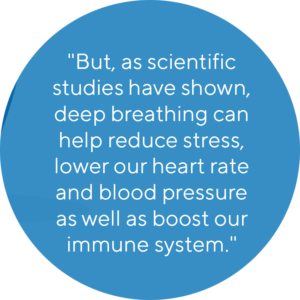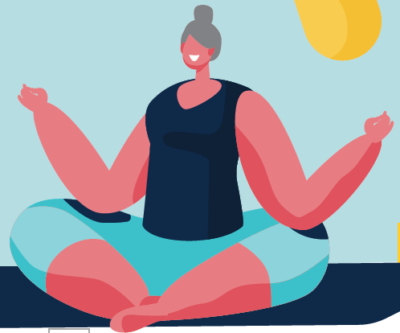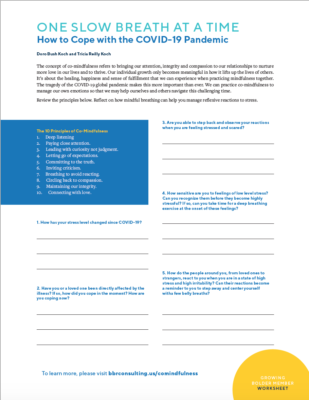Last Updated on January 20, 2021
These are distressing and uncertain times. We are facing a global health crisis unlike anything we have experienced. Countries are going on “lock-down;” businesses and schools are closing. To stay safe, people are physically isolating themselves from family and friends. The COVID-19 pandemic is disrupting our way of life to a degree that is unprecedented in modern times. It is only natural that entering such unchartered territory, people are feeling acutely stressed and anxious. A certain amount of anxiety can be a good thing, in fact, as it motivates us to become informed and take action to protect ourselves, our loved ones and our community. Too much anxiety and stress, however, especially over a prolonged period of time, can wreak havoc on our emotional and physical wellbeing.
One of the most effective ways to manage the fight-or-flight response so many of us are experiencing, in the face of this pandemic, is to practice deep breathing, also known as “diaphragmatic breathing” or “belly breathing.” Because breathing is something we do all the time without thinking about it, most of us tend to take our breathing for granted. But, as scientific studies have shown, deep breathing can help reduce stress, lower our heart rate and blood pressure as well as boost our immune system. The best news about deep breathing is that it’s free and available to us all the time no matter where we are or what might be happening in our world.

Deep breathing can initially feel uncomfortable, because most of us are so accustomed to shallow “chest breathing.” But what’s important to understand is that shallow chest breathing actually contributes to our feelings of stress and anxiety. By limiting the movement of our diaphragm, quick, shallow breathing fails to get a full dose of oxygenated air into the lowest part of our lungs. That lack of oxygen can make us feel short of breath and anxious. Worse, when we are feeling anxious, our breathing tends to be quicker and more shallow, exacerbating the fear, tension and stress that we already feel.
On the other hand, when you take deep, slow breaths, you signal to your brain that all is well, activating your parasympathetic nervous system, which decreases respiration and heart rate and increases digestion. So, when anxious thoughts begin to hijack your mind, stop and take a few moments to breathe deeply. The goal is to breathe at a rate of five breaths per minute, which translates into inhaling and exhaling to the count of six. If you’re not in the habit of breathing deeply, you may want to start with inhaling and exhaling to the count of three and working your way up to six.
Our breathing has the power to calm our minds and bring our awareness to the present moment. When we are conscious of our breathing, we get to experience the unfolding of our lives moment to moment. And in those moments, we have the freedom to choose how we live instead of being reactive. The vast scale of the COVID-19 pandemic can’t help but trigger our fight-or-flight response. After all, our lives collectively have been upended in ways that were unimaginable just a few weeks ago. But we don’t have to succumb to our anxiety and fear. We can pause, take a few conscious moments to breathe deeply and choose a more calm, measured and loving response to the new situation in which we find ourselves.

When you begin to feel fearful, irritated or anxious, inhale slowly to the count of six then exhale slowly to the count of six. The more we practice deep breathing, the more we will discover the peace and stillness that is always within us no matter what might be happening in our lives and world. In Thailand, the word for breathing is “hai jai,” which in English translates to “to give your heart.” When we breathe, we are giving our hearts to ourselves, to our loved ones and to our world. Let us take a deep collective breath and come together and support each other during this new and challenging time.
On our podcast “Health Gig,” we interview former NFL football player Keith Mitchell about how deep breathing helped him heal from a life-altering injury that he suffered on the football field.
Also, to help each other get through this pandemic with wisdom, grace and kindness, we are hosting a guided meditation every Sunday evening from 8 p.m. — 8:30 p.m. EST.
















